

 Vol. 39 (Number 35) Year 2018. Page 21
Vol. 39 (Number 35) Year 2018. Page 21
TABARES, Alexander 1; CANO, Jose A. 2
Received: 24/03/2018 • Approved: 02/05/2018
2. Theory of planned behavior in the context of entrepreneurship
ABSTRACT: Despite critical research on career choice intentions, we lack understanding of the antecedents to career choice intentions of successors, especially in emerging economy contexts. Building on the theory of planned behavior and with data obtained from GUESSS project, the article aims to analyze university students’ career choice intentions within a family business context. Our findings suggest that students with family business background are pessimistic about being successor, but optimistic about pursuing an entrepreneurial career. The paper contributes to the entrepreneurship literature by adding up insights from emerging countries to the debate. |
RESUMEN: A pesar de la creciente investigación sobre intención de elección de carrera, todavía hace falta una mayor comprensión de los antecedentes de intención de ser sucesor, especialmente en contextos de economías emergentes. Apoyados en la teoría del comportamiento planeado y con datos del proyecto GUESSS, el artículo tiene como objetivo analizar las intenciones de elección de carrera de estudiantes universitarios en el contexto de empresa familiar. Nuestros hallazgos sugieren que estos estudiantes son pesimistas acerca de ser sucesores, pero optimistas respecto a seguir una carrera empresarial. El documento contribuye a la literatura sobre emprendimiento al tener evidencia de países emergentes. |
In the last years, extensive literature of entrepreneurship has analyzed university students’ career choice intentions and motives of founder entrepreneurs: However, there is still a lack of understanding of the antecedents to career choice intentions of successors (Zellweger, Sieger, & Halter, 2011), specifically in emerging countries (Cano, Tabares, & Alvarez, 2017; Lima, Lopes, Nassif, & da Silva, 2015; Sieger & Monsen, 2015). Also, and despite a few noteworthy studies (Chrisman, Chua, & Sharma, 1998; Sharma, 2004; Zellweger et al., 2011), little is known about the underlying attitudes and motivations of intentional successors and how they differ from intentional founders or employees.
Thus, the study intends to analyze the university students’ family context and their career choice intentions from the theory of planned behavior (Ajzen, 1991, 2002) in an emerging economy such as Colombia (Cano & Tabares, 2017; Cano et al., 2017). This entrepreneurial intention is measured by three variables: the perceived desirability, the perceived behavioral control, and the subjective norm. Accordingly, we conduct an analysis of data generated in the Global University Entrepreneurial Spirit Students’ Survey (GUESSS), which considers a country sample of 801 students from 22 different universities in Colombia.
The main results of this research indicate low levels of perceived desirability and perceived behavior control on continuing with family firms. Conversely, these students present strong levels of self-efficacy and desirability on starting up their own business and pursuing an entrepreneurial career. Contrary to some other research findings, the succession intention is not strong, and it interestingly shows that the family business context encourages them to create and start up their own business with high levels of desirability and self-efficacy. As such the paper provides comprehensive evidence about entrepreneurial intention factors of university students and thus it contributes to the entrepreneurship literature by adding up insights from emerging countries to the debate. Finally, the paper offers practical implications for economic policy and for the scientific community.
The article is structured as follows. After this brief introduction, in the second section, we introduce the theoretical framework. The third section presents the details of the research methodology. The fourth section discusses the empirical results of the study. Finally, the article points out the most relevant conclusions and future lines of research.
To examine the antecedents of career choice intentions of successors, we draw on the theory of planned behavior (Ajzen, 2002). According to this author, the best single predictor of an individual's behavior will be a measure of his intention to perform that behavior (Ajzen, 1991). An intention is a state of mind directing a person's attention and experience toward a specific object or method of behaving (Zellweger et al., 2011). According to Ajzen (2002), intentions are formed because of three factors: attitude toward performing the behavior called perceived desirability, self-efficacy and locus of control also called perceived behavioral control and the socio-cultural context called subjective norm.
Regarding the last variable of subjective norm, the family plays a central role in the students’ career intention, even if their families have parents who are independent and self-employed (Zellweger et al., 2011). According to Chua, Chrisman, and Sharma (1999), these family-related life experiences play a major role in molding an individual's beliefs, attitudes, personality, and intentions where parents serve as positive role models. In academic research, there has been a long-standing debate about how the entrepreneurial experience of parents can influence the career intention of a university student (Stanley, Kellermanns, & Zellweger, 2017). In general, some research tends to agree that children of entrepreneur parents are more likely to become entrepreneurs (Laspita, Breugst, Heblich, & Patzelt, 2012) or continue with their family business (Zellweger, Richards, Sieger, & Patel, 2016). In this sense, family members and, in particular, parents may be seen as powerful others (Zellweger et al., 2016) given their overlapping role as altruistic parents and owner-managers of the largest part of the family's wealth and legacy (Zellweger et al., 2011).
Thus, students with family business background stem from a particular family context that may mold their future career intentions (Sieger & Monsen, 2015). According to Zellweger et al. (2011), when university students join the family firm they must deal with an organizational context that is often characterized by legacy concerns, person-dependent governance structures, and owner-centric organizational cultures. Consequently, the succession intention may seem attractive only to a specific type of individual with specific levels of perceived desirability and perceived behavioral control (Stavrou, 1999).
In this study, we analyze the university students’ career choice intentions, particularly the intentions of being successors of their family business. The data are generated in the Global University Entrepreneurial Spirit Students’ Survey (GUESSS), an international research project that adopts and tests the theory of plan behavior model. This GUESSS project organized and conducted by the UGC-HSG Institute of the University of St. Gallen (Switzerland) has originally the participation of 34 countries and more than 700 universities worldwide with more than 109,000 students. This Swiss institute sends an online survey to each participating country so that a country team is responsible for implementing the survey at universities who wish to participate.
The survey contains sets of multiple-choice questions employing scales of five and seven points and it examines different aspects such as basic student information, education level, career choice intentions (in this study career choice of successors). For the edition, 2013-2014, Colombia takes part of this international research project for the first time and with the leadership of the Universidad de Medellin, the survey is conducted in six universities, providing a final sample size of 801 students.
In order to achieve validity and reliability, the survey examines all the motivational determinant factors that influence behavior in terms of three dimensions: the perceived desirability, the perceived behavioral control in terms of strength of entrepreneurial intention and the subjective norm in terms of family business context. In order to identify these variables of entrepreneurial intention of successors, these students are asked how many companies their parents have, the number of years they have owned them, number of employees, the level of engagement with the family firms and some perceptions about the parent’s firm company performance in contrast to competing firms, the degree of relationship and commitment to parent’s firm, and the degree of intention to be a successor.
The central aim of GUESSS study is to analyze the entrepreneurial intentions of university students. However, this paper goes deeper, and it focuses attention on family business due to the economic and social importance for entrepreneurship as well as the choice of business succession from the parents to their offspring who are now university students. As such, the study analyzes university students whose parents own one or more businesses and decide potentially to offer their offspring the opportunity to take over the family firm. As such, the GUESSS study asks university students if their parents are currently working on their own and/or have their own businesses. Figure 1 provides a general perspective of the family context surrounding university students.
Figure 1
University students and self-employed parents
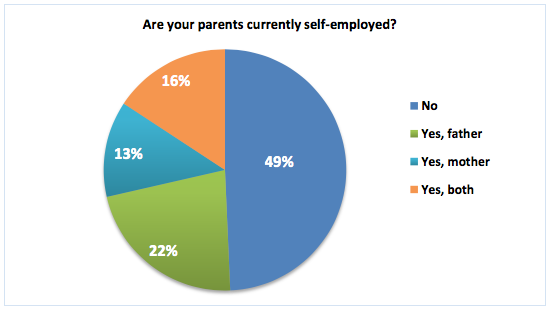
According to this information, about half of the students surveyed in the study (51%) indicate that at least one of their parents are independent workers and have their own business. These results highlight a significant percentage of students with an entrepreneurial family environment, which can be very conducive to potentiate their entrepreneurial behavior. Another very important fact is that, as some other scholars have demonstrated, the male gender is above the female one in terms of the entrepreneurial activities. This time, 23% answered that they have fathers who work on their own, in contrast to 13% who respond that it is their mothers who work in this way.
With the aim of understanding more the context of students with family business, these students are asked how many companies their parents have and, particularly, if they have more than one company. Figure 2 shows that 87.6% of these students have business parents with one company. Interestingly, 12.5% of them have parents with two or more firms: it is distinguished the fact that 9% of these students’ parents own two meanwhile a 1% run more than 9 firms, indicating that they are probably serial entrepreneurs who could influence critically their offspring whether to run family business or to start up their own business.
Figure 2
Number of firms that the parents own
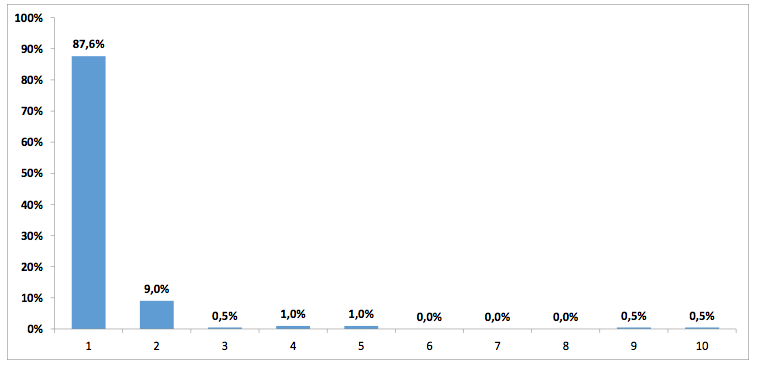
The study goes further and asks university students with family business the period of years in which the parents have owned their firms. According to Figure 3, the results indicate that 27.8% of the companies have been created in the last five years which suggests that these family firms are young and non-traditional. The remaining 72.2% of companies have more than five years of operation, which suggests that these companies are stable. An average ownership time of 14.2 years also remarks the fact that these family firms have survived in time and they become a central analysis for future research to understand how they have overpassed difficulties and have adapted to changing and competitive markets.
Figure 3
Number of years that parents have owned their businesses
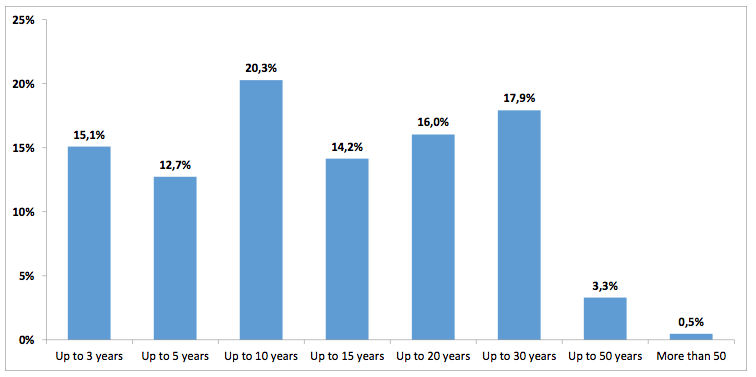
The study also asks university students with entrepreneur parents about the number of employees working in their companies. Figure 4 shows that in Colombia the average per company is 11.8 employees. More detailed, the study notes that 36.7% of companies have more than 5 employees, which implies that these companies offer employment, are relatively well constituted and stable, generating positive social and economic impacts. Likewise, 29.8% of these family businesses have between 3 and 5 employees, and the remaining 33.5% of family businesses have two, one or no employees, which indicates that this type of family firms can be classified as a microenterprise by its number of employees.
Figure 4
Number of employees working for the family business
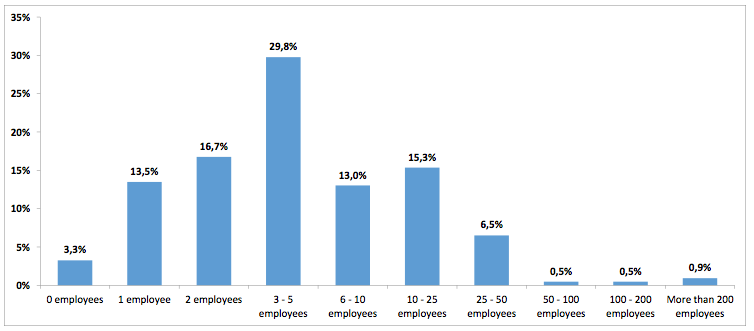
Other important data from GUESSS study also helps understand the context and dynamics of family businesses. The study requests university students general information of the family business such as, if any of the parents is actively part of the management and/or daily operation of the company; if the company is founded by a member of the family; if one of the parents acts as general manager of the company; and if they, as university students, are currently working in the family business. Figure 5 shows that 73.2% of students with family business do not work in the company. Only a quarter of them is working and they are an active part of the business. Two interesting facts in the Colombian sample is that, first, there is a high participation of parents in the day-to-day management and operation of their companies and, second, the great majority of the companies belonging to students’ parents were founded by a member of their family.
Figure 5
General information about the family business
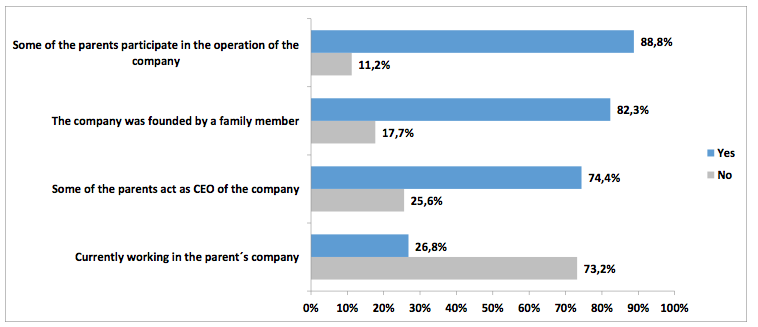
For university students who work in their parent's company, the study requests information regarding the time they have spent engaged in family businesses. Figure 6 shows that on average a university student has been working in their family business for a period of 4.6 years. Specifically, 56.3% of these students have worked in a range of 0 to 5 years and 43.8% of them between 6 and 9 years. This last percentage is significant and indicates that there is an acquired experience of the specific company and market knowledge which could offer them the necessary skills to start up their own business or simply to replace their parents in the management and operation of the family business.
Figure 6
Years working in the company of the parents
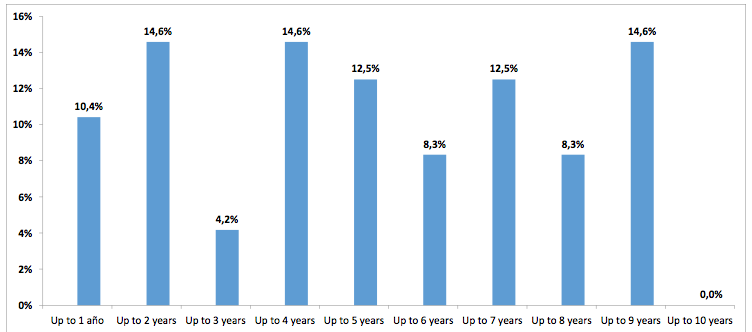
Regarding the industry sectors where the family business is carried out, Figure 7 shows that the wholesale and retail trade sector is the highest with a percentage of 41.1%, followed by the construction and manufacturing sector with 5.6%.
Figure 7
Industry sector where the business activity of the parents is developed
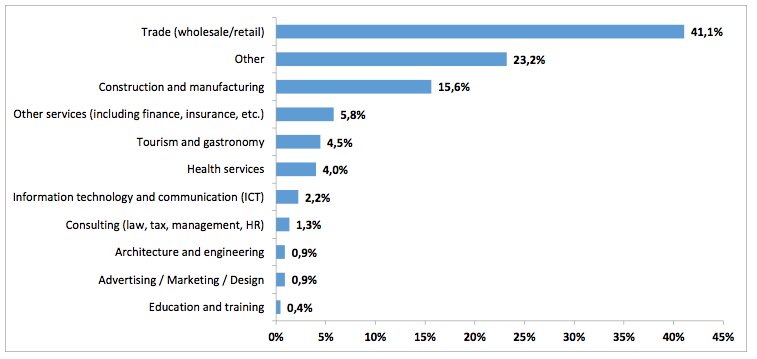
This data analysis shows a significant change with respect to the intentions of nascent and active entrepreneurs (Cano et al., 2017) since the information and communication technology sector does not represent the most favored in these students with family business, occupying the seventh place with a percentage of only 2.2%. Interestingly, it is observed that the service sector, including financial, tourism and health, is well developed. Contrastingly, the sectors with the lowest percentage of participation in family businesses are in the area of education-training and advertising, marketing, architecture, and engineering, with percentages that do not reach 1% of the total population.
On the other hand and based on the performance of the last 3 years, university students, working in their parent's company, are asked about their expectations of the performance and competitiveness of their parents' company in contrast to the competitors. Figure 8 presents the answers that are in a range of options that goes from much worse to much better. In this way, 80.7% of students have a positive expectation of performance, while 30% of them expect it to be unchanged. Conversely, only 19.5% have a negative expectation. This reflects an optimistic expectation of performance by this type of students with family businesses.
Figure 8
Parent company performance in contrast to competing firms
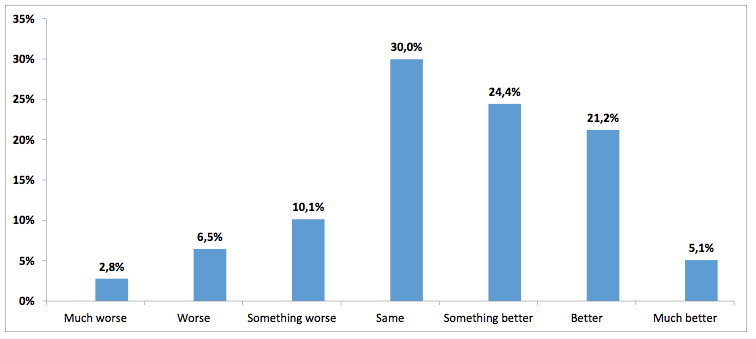
After analyzing the performance of family businesses, we also analyze five dimensions of performance and competitiveness in order to understand how students value expectations of sales growth, profits, market share, innovative character, and employment generation of the parents' firms in contrast to their competitors. The scale goes from 1 to 7 (1 = worst, 7 = better). Figure 9 indicates that there are three dimensions that outperform competition over the last three years: better sales growth, better profit growth, and better market share growth with averages of 4.8, 4.8 and 4.7 respectively. The innovating factor and employment generation, are shown with a lower valuation, with values of 4.1.
Figure 9
Performance dimensions of the parent company compared to competing firms
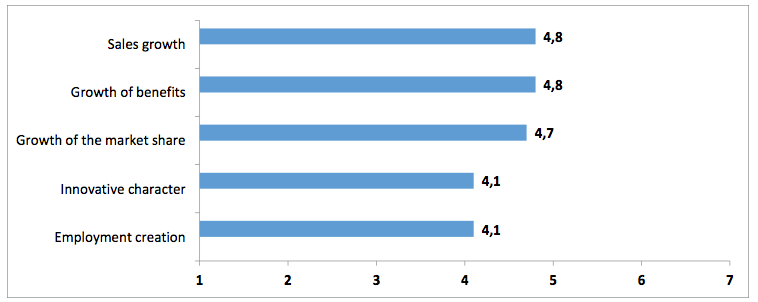
In order to analyze the perceived desirability and the perceived behavioral control dimensions, we analyze the degree of relationship and commitment that university students working in their family business have with their parents' company. As such, it is used a scale from 1 to 7 (1 = very low, 7 = very high) to determine that degree. Figure 10 shows that 54.2% of these students state they have relatively high levels of relationship and commitment to the family business. It should be noted that almost a third of students (28.7%) claim they have low levels of relationship and commitment to the family business. Interestingly, these data become relevant because it allows to understand how the relationship between information and commitment to the family business could influence the students’ career intention, which among others includes being a successor.
Figure 10
The degree of relationship and commitment to parent’s firms

With the aim of amplifying the analysis of perceived desirability and perceived behavioral control dimensions, the percentage of students who claimed to have had a medium or high level of relationship and commitment to the family business are asked and inquired about the reasons why they assume that degree of relationship and commitment. The results are shown in Figure 11, on a scale of valuations ranging from 1 to 7 (1 = very low, 7 = very high).
Figure 11
Dimensions of the degree of relationship and commitment to parent’s firms

University students with a medium or high level of relationship and commitment highlight three aspects in particular that generate that engagement with the family business. These three aspects are the following: keeping the company in the hands of the family (4.7%); sentimental and positive thinking (4.7%); a good knowledge of the financial performance of the company (4.6%). Among the dimensions with lower levels, it is identified the feeling of attachment for being a family business (4.1%) and the historical tradition of the family to inherit the management of the company (4.0%).
Within the total sample of university students with a family business, we also aim to analyze the degree of intention to be a successor on a scale of 1 to 7 (1 = very low, 7 = very high). Figure 12, points out that in Colombia the degree of intention to be successor has an average value of 3.0, which denotes a medium-low degree of intention of the students for being successors. In percentages, 65.7% of the university students show a low level of intention to manage the family companies. In line with the above, only 22.4% of university students show a high level of intention to succeed their parents.
Figure 12
The degree of intention to be a successor
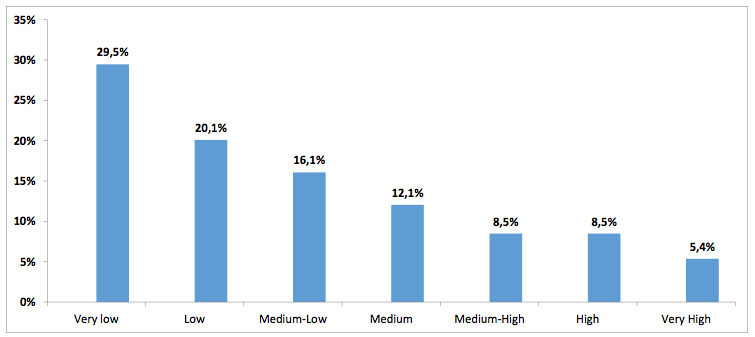
After analyzing the degree of intention to be the successor of the students with family companies, we then analyze the perceived desirability with six dimensions of intention to be successor where the motivations, expectations, and commitments are explored on a scale of 1 to 7 (1 = very low, 7 = very high). As such, Figure 13 indicates low rates of student motivation, expectation, and commitment to the family business, as the average of the six dimensions is below a score of 3.0, a medium-low valuation for the measurement scale used.
Figure 13
Dimensions of the degree of intention to be a successor
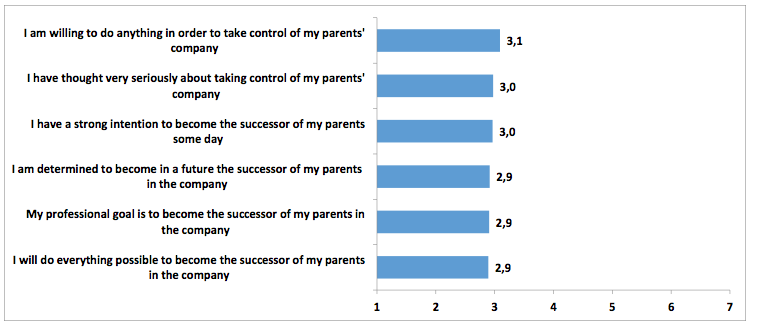
In that sense, the results indicate that the students have relatively low intentions to assume control of the family company and consequently they do not have the perceived desirability to go on with their parents’ company neither the short, medium or long term.
In this study, we analyzed the university students’ career choice intentions, particularly the intentions of being successors of their family business. The data are generated from GUESSS and the study adopts and tests the theory of planned behavior model. The main results of this research indicate low levels of perceived desirability and perceived behavior control on continuing with family firms. Conversely, these students present strong levels of self-efficacy and desirability on starting up their own business and pursuing an entrepreneurial career. Contrary to some other research findings worldwide, in Colombia, the succession intention of university students is not strong, and it interestingly shows that the family business context, in turn, encourages them to create and start up their own business with high levels of desirability and self-efficacy. As such, the family business context is not decisive for the intentions of being a successor, but it does play a central role in the students’ career intention to create or start up their own business.
Findings also indicate the importance and relevance of family firms in the analysis of students’ entrepreneurial intention since more than half of university students surveyed in the sample have parents with own business. Due to the high percentage of students with parents owning their own business, future research lines could examine how this family business context affects university students’ career intentions. Furthermore, it is distinguished that most of the family firms are classified as a micro-enterprise with an average ownership time of 14.2 years. In this sense, it is critical to understand how this type of family firms survive in the time and how they overpass difficulties and adapt to changing and competitive markets. Similarly, it would be interesting to research on what resources and capabilities the students build up in their family firms or how the acquired experience and specific knowledge they obtain in family business help them start up their own business.
The results also illustrate that only a low percentage of students are actively working in their family business and that their level of engagement and commitment are relatively low. Therefore, a call is made for more research on understanding why these students are not enthusiastic about working and eventually continuing to run the family business. In this respect, it would be interesting to know in which entrepreneurial activities and start-ups, different from their family business, they would like to participate.
Although the results can be considered relevant for empirical contexts in future investigations in Colombia, some limitations may be perceived. One is that the study sample should be extended to more universities in different cities. Another issue that should be considered in future work is the combination of qualitative and quantitative methods in order to set strong theoretical constructs that allow a better understanding and a good measuring of university students’ intentions of being successors. Finally, this study could be the basis for later research studies to make a comparative analysis with other economies both developing and developed as well.
AJZEN, I. (1991). The theory of planned behavior. Organizational Behavior and Human Decision Processes, 50(2), 179–211.
AJZEN, I. (2002). Perceived Behavioral Control, Self-Efficacy, Locus of Control, and the Theory of Planned Behavior 1. Journal of Applied Social Psychology, 32(4), 665–683.
CANO, J. A., & TABARES, A. (2017). Determinants of university students’ entrepreneurial intention: GUESSS Colombia study. Espacios, 38(45), 22 . Retrieved from http://www.revistaespacios.com/a17v38n45/17384522.html
CANO, J. A., TABARES, A., & ALVAREZ, C. (2017). University students’ career choice intentions: Guesss Colombia study. Espacios, 38(5), 20. Retrieved from http://www.revistaespacios.com/a17v38n05/17380520.html
CHRISMAN, J. J., CHUA, J. H., & SHARMA, P. (1998). Important Attributes of Successors in Family Businesses: An Exploratory Study. Family Business Review, 11(1), 19–34.
CHUA, J. H., CHRISMAN, J. J., & SHARMA, P. (1999). Defining the Family Business by Behavior. Entrepreneurship Theory and Practice, 23(4), 19–39.
LASPITA, S., BREUGST, N., HEBLICH, S., & PATZELT, H. (2012). Intergenerational transmission of entrepreneurial intentions. Journal of Business Venturing, 27(4), 414–435.
LIMA, E., LOPES, R. M., NASSIF, V., & DA SILVA, D. (2015). Opportunities to Improve Entrepreneurship Education: Contributions Considering Brazilian Challenges. Journal of Small Business Management, 53(4), 1033–1051.
SHARMA, P. (2004). An Overview of the Field of Family Business Studies: Current Status and Directions for the Future. Family Business Review, 17(1), 1–36.
SIEGER, P., & MONSEN, E. (2015). Founder, Academic, or Employee? A Nuanced Study of Career Choice Intentions. Journal of Small Business Management, 53, 30–57.
STANLEY, L., KELLERMANNS, F. W., & ZELLWEGER, T. M. (2017). Latent Profile Analysis. Family Business Review, 30(1), 84–102.
STAVROU, E. (1999). Succession in Family Businesses: Exploring the Effects of Demographic Factors on... Journal of Small Business Management, 37(3), 43–61.
ZELLWEGER, T., RICHARDS, M., SIEGER, P., & PATEL, P. C. (2016). How Much Am I Expected to Pay for My Parents’ Firm? An Institutional Logics Perspective on Family Discounts. Entrepreneurship Theory and Practice, 40(5), 1041–1069.
ZELLWEGER, T., SIEGER, P., & HALTER, F. (2011). Should I stay or should I go? Career choice intentions of students with family business background. Journal of Business Venturing, 26(5), 521–536.
1. Universidad de Medellín. PhD in Management. atabares@udem.edu.co
2. Universidad de Medellín. Industrial Engineer, Master in Administrative Engineering. jacano@udem.edu.co